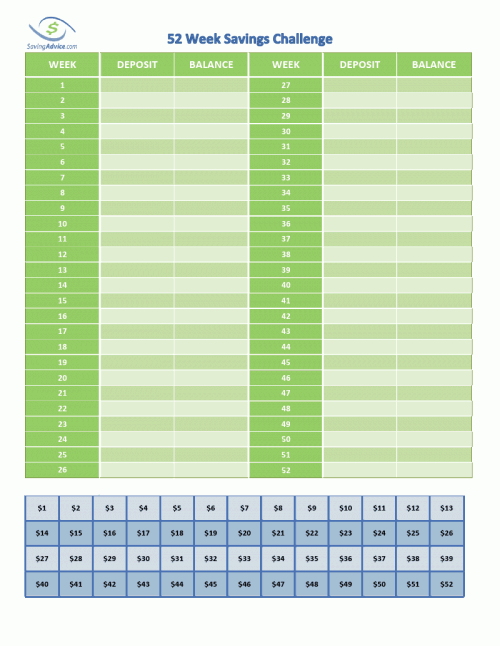
How the 52 Week Money Challenge Works
In a lot of ways, the 52 Week Money Challenge is similar to a game of Yahtzee. There are 52 weeks in the year with a dollar amount corresponding to all 52 weeks. Each week your goal is to try to save the highest amount that is still available from the bottom numbers. While the highest dollar amount is the goal, there will certainly be weeks when you aren’t able to save the full amount. Whatever amount you are able to save each week, that is the number that you write and then cross that number off the bottom. It’s fine if a particular month you’re unable to save much due to special occasions. Focus on the bigger picture and don’t worry about individual days and weeks so much.

For example, say that you are able to save $42 the first week you begin the challenge. You would X out the $42 at the bottom of the chart and place it in the deposit line for week one and that would also be your balance since it is the first week. In week two you are able to save $18. You X out the $18 at the bottom of the chart and place $18 in the deposit line. You then would place $60 as the balance ($42 + $18) for week two. In week three you’re able to save $52 which you cross off, add and come away with a balance of $112. In week four, you have a tough week and are only able to save a single dollar. You cross it off, deposit the $1 and up your balance to $113.
This is a bit old fashioned, but printing out the physical paper and writing down the amount you saved with a pen or pencil works to build good habits.
Save As Much As You Can, But Be Flexible
Because you choose the amount to save each week in relation to your finances (always with the goal to try to save the top dollar amount still available at the bottom of the chart), you don’t fail the challenge just because you have a few rough weeks where you aren’t able to save a lot of money. We all have good weeks and we all have bad weeks and they don’t come about uniformly. By trying to save the most you can each week which takes into account the financial realities of that week, it gives you much-needed flexibility and a better chance of success compared to having a set dollar amount you must save each week that corresponds to that specific week.
Another advantage is that there is no need to begin this challenge at the beginning of the year, but you can start at any time. Week one is the first week you begin (as opposed to the first week of the calendar year). That means that if you come across this challenge in the summer, there is no need to wait half a year to begin. You can start today. Simply designate one day of the week when you will make the deposit and you are ready to go for an entire year from that point.
Get Started, Get in the Habit of Saving
The most important aspect of this challenge is that you simply begin doing it. Even if the first few weeks your saving amount is low, you are getting yourself into the habit of saving. As you become comfortable with that habit, you should find more ways to save that will help you knock off those bigger numbers always knowing that you have some small numbers there as well if finances get tight some weeks. Once in the habit, you may find it easy to save even more. There are also now kids versions of this challenge which replace the dollar amount with quarters, dimes, nickels or pennies depending on how old your child is and the amount that he wants to save.
Find Community To Support You In the 52 Week Money Challenge
Print the 52 Week Money Challenge by clicking here. Before you get started, also check out the 52 Week Money Challenge forum group where you can share how your challenge is going with others and both receive and provide support for others participating in the challenge.
Lastly, there are lots of other write up on the 52 week money challenge. Bankrate has one, so does The Simple Dollar. Finally lgfcu has a nice 52 week money challenge chart if the one in this article doesn’t suffice.
And finally if you are looking for a spot to put your money while you’re saving it, Forbes has a good listing of the best high yield savings accounts currently available, here.
Jeffrey strain is a freelance author, his work has appeared at The Street.com and seekingalpha.com. In addition to having authored thousands of articles, Jeffrey is a former resident of Japan, former owner of Savingadvice.com and a professional digital nomad.
Comments